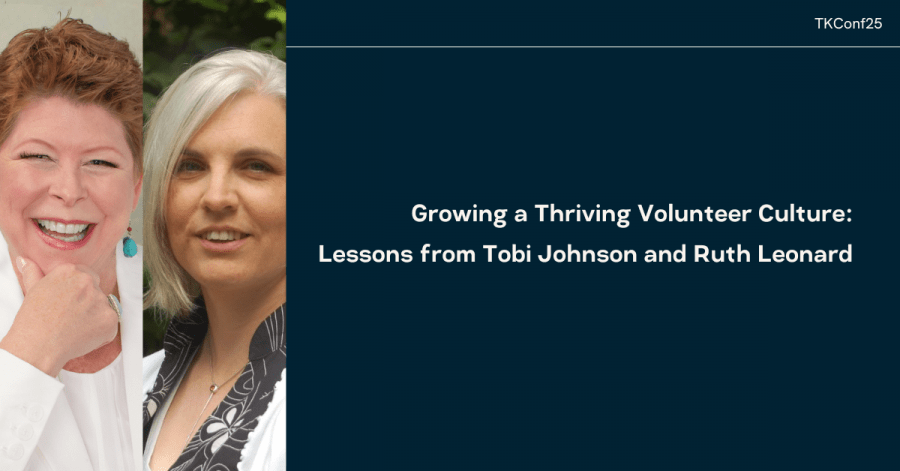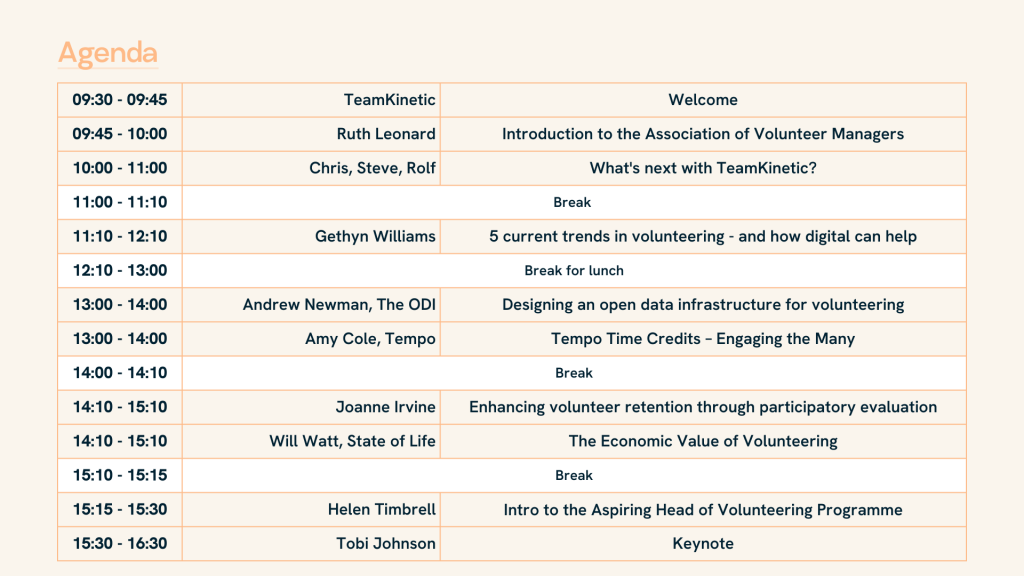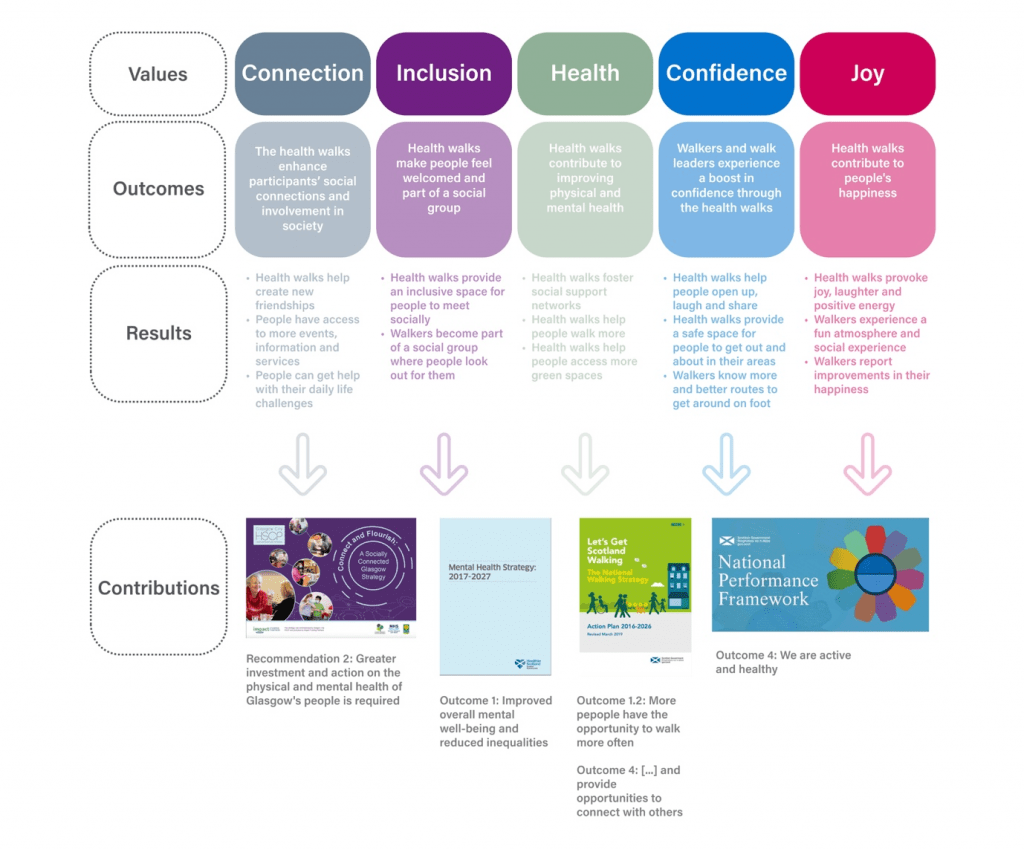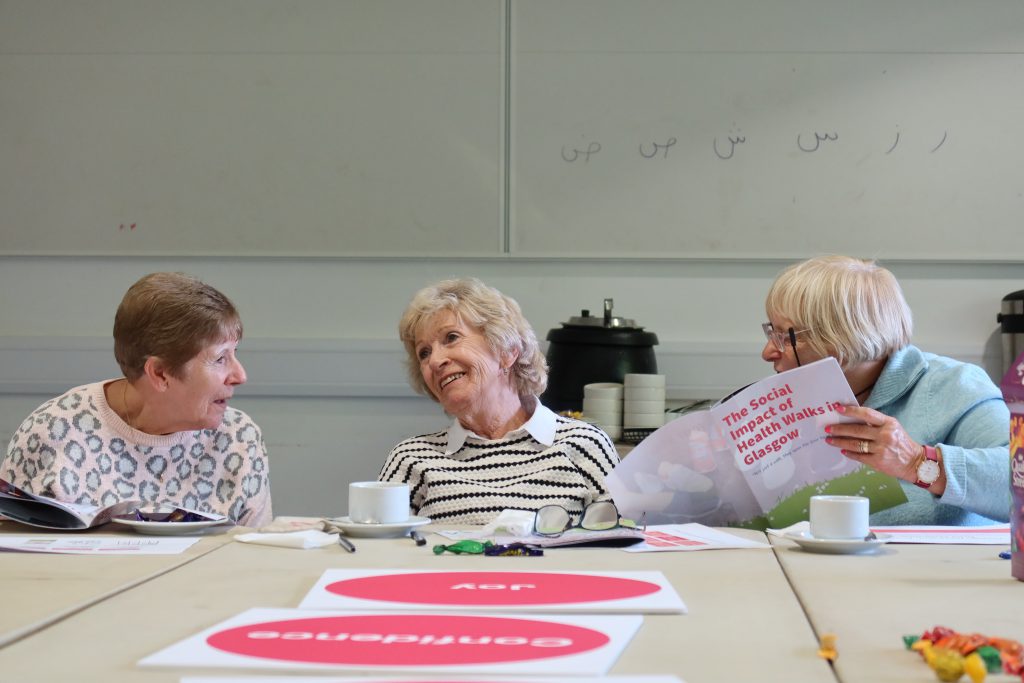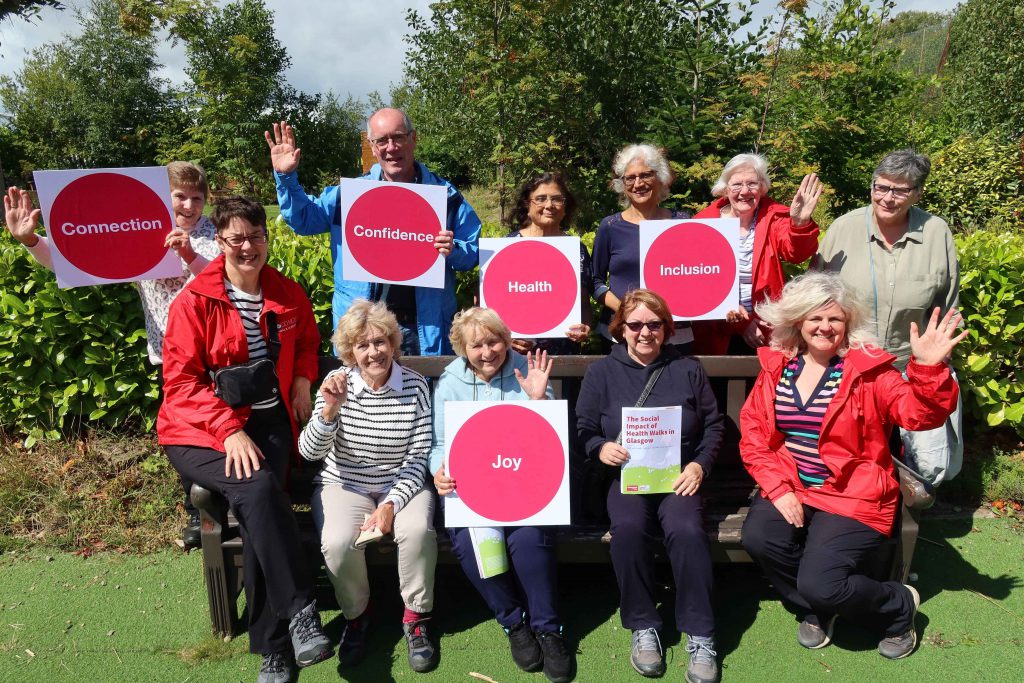At this year’s TK Conference, Gethyn Williams shared his insights into five big trends shaping the future of volunteering and what they mean for volunteer managers on the ground.
From AI to inclusivity, his message was clear: volunteering doesn’t exist in a bubble. The way people volunteer is changing, just as fast as the world around them. The good news? With the right approach, these changes bring more opportunities than challenges.
Let’s dig into the five trends and how you can make them work for your organisation.
1. Reaching the Next Generation
First, Gethyn explored reaching the next generation through micro volunteering. Micro-volunteering, remote roles, and flexible shifts can open your organisation to new volunteers.
I’m sure you’re all aware what micro volunteering is by now. If you’re not, it basically refers to small, manageable tasks that volunteers can do. These are often online and sometimes available as one-off opportunities or tasks.
So what sort of opportunities can you offer to entice the next generation into volunteering?
Younger volunteers often want to make a meaningful impact and see a clear link between their time and the difference it makes. They’re drawn to opportunities that align with their values. Whether that’s social, environmental, or community-focused.
However, they also have less time and prefer short-form content – the TikTok generation! That’s where micro volunteering comes in. One-off tasks, or flexible roles that can be done remotely, fit this need perfectly.
Micro-volunteering doesn’t replace longer-term commitment, and you don’t have to solely rely on these short tasks. But it opens doors for people who might not otherwise volunteer. And, when done well, can lead to longer-term commitment.
2. AI and Volunteering
AI is the ‘big one’ right now. It’s dominating conversations everywhere. Like other digital trends, it started outside the volunteering world, but it feels time for volunteer managers to find useful, ethical ways to apply it to their work.
Gethyn shared how he’s been using AI to analyse survey responses, especially long, open-ended ones that can take days to review. AI tools can sort feedback, detect patterns, and even analyse sentiment. All faster and more objectively than we might manage manually.
The real discussion, Gethyn said, is whether AI should be our co-pilot or our replacement. He asked us to imagine a system that could do it all…
Imagine an AI tool that could automatically screen volunteer applications, predict a candidate’s likelihood of long-term retention with 85% accuracy, and schedule their first shift – all without human input.
Gethyn Williams
Sounds efficient, right? But it also raises big ethical questions: What happens to personal connection? How do we handle bias or fairness?
The session poll captured this tension perfectly. Attendees saw both opportunities (less admin, faster onboarding, freeing up time for engagement) and dilemmas (loss of human warmth, accuracy issues, and even the environmental impact of AI’s energy use).
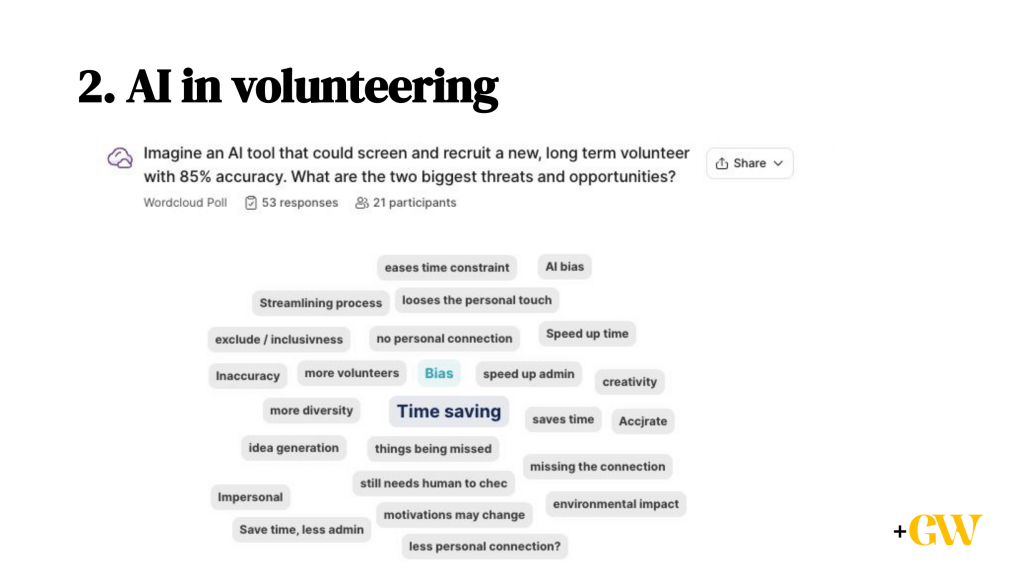
So what now?
We say start small and stay human. Try AI where it genuinely helps, like cutting down on repetitive admin, but keep people at the heart of every decision. AI should be your co-pilot, not your replacement.
3. National Recruitment Platforms
National online recruitment platforms are another hot topic in volunteering right now. With tools like The Big Help Out, GoVo (the new RVS platform), and Reach Volunteering’s relaunch, there’s no shortage of innovation in how people find opportunities.
Gethyn suggested that strong recruitment strategies will use a mix of local and national platforms. Local ones for community connections, and national ones for reaching those who’ve never volunteered before.
But there’s a tension: are these platforms delivering the right volunteers, or simply ready volunteers who want to get started now? Both have value, but they serve different needs.
“Do national platforms work for our convenience, or for the volunteer’s? Maybe the trick is finding the balance.”
Advice for you…
Experiment, share what works, and don’t expect one platform to do it all. Volunteers, like everyone else, have their preferred brands and channels. Meeting them where they are is part of the challenge… and the opportunity!
4. Open Data
Open data might sound dry, but it can be exciting when you look at what it can do.
Gethyn compared it to the open banking revolution, where shared data standards transformed how financial systems talk to each other. Imagine the same for volunteering platforms. Data flowing freely between systems to make recruitment, reporting, and collaboration smoother for everyone.
There’s already work underway to create open data standards for volunteering, supported by the Digital in Volunteering Community of Practice. It’s a great place for volunteer managers to get involved and help shape what that looks like.
He also raised an intriguing idea: a national volunteering data hub. While the UK already has solid research, we still lack certain insights. What’s the average conversion rate from enquiry to placement? How long do volunteers typically stay involved? Which groups aren’t volunteering and why?
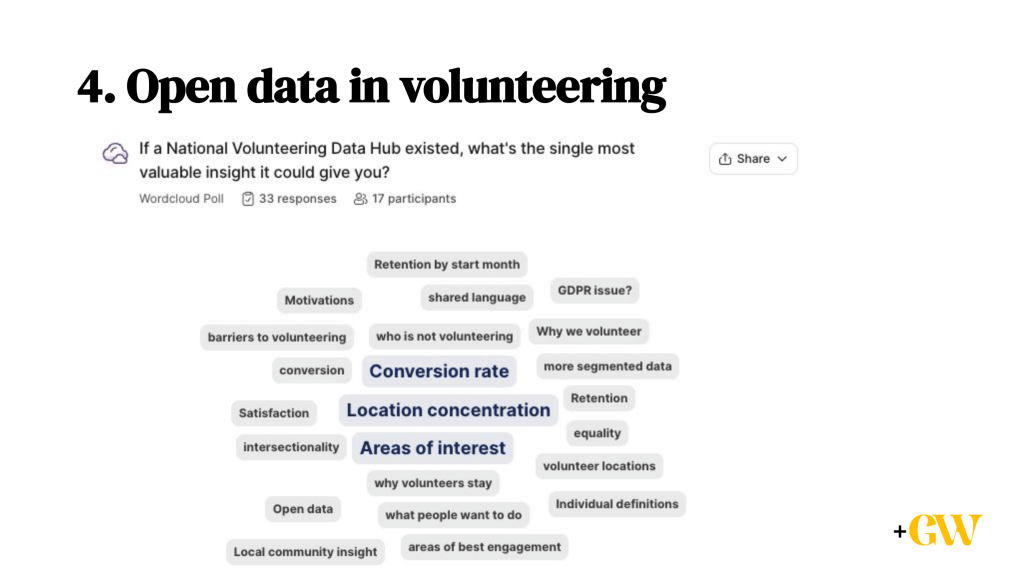
Shared data could also help answer these questions and lead to smarter decisions across the sector. As Gethyn put it:
“Maybe it’s time we talked more seriously about open data in volunteering and what it could make possible.”
5. Rise of the Digital Volunteer
This “bonus round” from Gethyn looked at the growing rise of digital and skilled volunteering. Moving beyond quick micro-tasks to harness professional expertise for good.
These volunteers often lead with their skills rather than a specific cause. As Gethyn put it, their “professional skills” fader is turned right up, and that opens up exciting new possibilities. They don’t need to live nearby or even know your charity. These volunteers are motivated by the chance to use what they know to make a difference.
He invited us to imagine charities as “gigs for good”, where small, time-limited digital projects tap into professional talent. Think of tasks like improving SEO, designing templates, revamping a website, or creating social media videos. The kind of digital wish-list items that could be done in under 10 hours by a skilled volunteer.
Platforms like Reach Volunteering are seeing growth here, especially since COVID. Professionals are looking for flexible, meaningful ways to contribute online.
Gethyn encouraged everyone to take a fresh look at their digital to-do list and see what could be turned into a short, contained project. Give volunteers a simple way to build skills, confidence, and capacity across the sector.
Key Takeaways for You
- Digital is here to stay: the question isn’t if you go digital, but how.
- Experience is everything: volunteers expect the same ease and care they get from any modern service.
- Learn from outside the sector: marketing, UX, and data principles aren’t just for businesses; they work brilliantly in volunteer management too.
- Start small, learn fast: test, and tweak. You’ll learn more by doing than by waiting for the ‘perfect’ system.
So, now’s the time for you to think about how you can take these emerging trends and apply them to your own work. Perhaps you’d like help with taking on the points raised in Gethyn’s session?
The Digital in Volunteering Community of Practice is a place for anyone involved in volunteering to come together, share ideas, access key resources, and join regular workshops on using digital in volunteering. Not to mention, it’s the only place you can access the Digital in Volunteering Toolkit! Best of all, it’s completely free. You can join now via this link.
If you want to contact Gethyn for further advice, you can find him at gethynwilliams.net
As always, you can find TeamKinetic via our links below:

